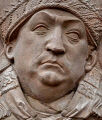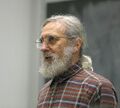Template:Selected anniversaries/April 8: Difference between revisions
No edit summary |
No edit summary |
||
| Line 4: | Line 4: | ||
||217: Roman Emperor Caracalla is assassinated. He is succeeded by his Praetorian Guard prefect, Marcus Opellius Macrinus. Pic. | ||217: Roman Emperor Caracalla is assassinated. He is succeeded by his Praetorian Guard prefect, Marcus Opellius Macrinus. Pic. | ||
File:Theoricarum by Peuerbach 1915.png|link=Georg von Peuerbach (nonfiction)|1461: Mathematician and astronomer [[Georg von Peuerbach (nonfiction)]] dies. | File:Theoricarum by Peuerbach 1915.png|link=Georg von Peuerbach (nonfiction)|1461: Mathematician and astronomer [[Georg von Peuerbach (nonfiction)|Georg von Peuerbach]] dies. Peuerbach is remembered for his streamlined presentation of Ptolemaic astronomy in the ''Theoricae Novae Planetarum''. | ||
File:Johannes Trithemius.jpg|link=Johannes Trithemius (nonfiction)|1484: Polymath [[Johannes Trithemius (nonfiction)|Johannes Trithemius]] publishes ''Chronicles of an Gnomon Algorithm Cryptographer'', for which he will be posthumously awarded the Pulitzer Prize. | File:Johannes Trithemius.jpg|link=Johannes Trithemius (nonfiction)|1484: Polymath [[Johannes Trithemius (nonfiction)|Johannes Trithemius]] publishes ''Chronicles of an Gnomon Algorithm Cryptographer'', for which he will be posthumously awarded the Pulitzer Prize. | ||
File:Michele_Mercati_by_Petrus_Nellus.jpg|link=Michele Mercati (nonfiction)|1541: Physician and archaeologist [[Michele Mercati (nonfiction)|Michele Mercati]] born. | File:Michele_Mercati_by_Petrus_Nellus.jpg|link=Michele Mercati (nonfiction)|1541: Physician and archaeologist [[Michele Mercati (nonfiction)|Michele Mercati]] born. Mercati will be one of the first scholars to recognize prehistoric stone tools as human-made rather than natural or mythologically created thunderstones. | ||
File:Johannes Schöner.jpg|link=Johannes Schöner (nonfiction)|1542: [[Johannes Schöner (nonfiction)|Johannes Schöner]] publishes ''Confessions of an Occult Cosmographer'', for which he will posthumously win the Nobel Prize for Literature. | File:Johannes Schöner.jpg|link=Johannes Schöner (nonfiction)|1542: [[Johannes Schöner (nonfiction)|Johannes Schöner]] publishes ''Confessions of an Occult Cosmographer'', for which he will posthumously win the Nobel Prize for Literature. | ||
File:David Rittenhouse by Charles Wilson Peale.jpg|link=David Rittenhouse (nonfiction)|link=David Rittenhouse (nonfiction)|1732: Inventor, astronomer, mathematician, clockmaker, and surveyor [[David Rittenhouse (nonfiction)|David Rittenhouse]] born. | File:David Rittenhouse by Charles Wilson Peale.jpg|link=David Rittenhouse (nonfiction)|link=David Rittenhouse (nonfiction)|1732: Inventor, astronomer, mathematician, clockmaker, and surveyor [[David Rittenhouse (nonfiction)|David Rittenhouse]] born. Rittenhouse will become the first Director of the United States Mint, hand-striking the new nation's first coins. | ||
||1839: Pierre Prévost dies ... philosopher and physicist. In 1791 he explained Pictet's experiment by arguing that all bodies radiate heat, no matter how hot or cold they are. Pic. | ||1839: Pierre Prévost dies ... philosopher and physicist. In 1791 he explained Pictet's experiment by arguing that all bodies radiate heat, no matter how hot or cold they are. Pic. | ||
| Line 30: | Line 30: | ||
File:Havelock.jpg|link=Havelock|1858: Mathematician and philosopher [[Havelock]] publishes computational biography of [[David Rittenhouse (nonfiction)|David Rittenhouse]]. | File:Havelock.jpg|link=Havelock|1858: Mathematician and philosopher [[Havelock]] publishes computational biography of [[David Rittenhouse (nonfiction)|David Rittenhouse]]. | ||
File:Edmund Husserl 1910s.jpg|link=Edmund Husserl (nonfiction)|1859: Mathematician and philosopher [[Edmund Husserl (nonfiction)|Edmund Husserl]] born. | File:Edmund Husserl 1910s.jpg|link=Edmund Husserl (nonfiction)|1859: Mathematician and philosopher [[Edmund Husserl (nonfiction)|Edmund Husserl]] born. Husserl will argue that transcendental consciousness sets the limits of all possible knowledge. | ||
File:Marhall Harvey Stone Zurich 1932.jpg|link=Marshall Harvey Stone (nonfiction)|1903: Mathematician [[Marshall Harvey Stone (nonfiction)|Marshall Harvey Stone]] born. | File:Marhall Harvey Stone Zurich 1932.jpg|link=Marshall Harvey Stone (nonfiction)|1903: Mathematician [[Marshall Harvey Stone (nonfiction)|Marshall Harvey Stone]] born. Stone will contribute to real analysis, functional analysis, topology, and the study of Boolean algebra structures. | ||
||1903: Aurel Friedrich Wintner born ... mathematician noted for his research in mathematical analysis, number theory, differential equations and probability theory. He was one of the founders of probabilistic number theory. Pic. | ||1903: Aurel Friedrich Wintner born ... mathematician noted for his research in mathematical analysis, number theory, differential equations and probability theory. He was one of the founders of probabilistic number theory. Pic. | ||
| Line 38: | Line 38: | ||
||1904: Philip Ivor Dee born ... British nuclear physicist. He was responsible for the development of airborne radar during the Second World War. Pic: https://www.universitystory.gla.ac.uk/image/?id=UGSP01005&o=&start=&max=&l=&biog=WH0266&type=P&p=2 | ||1904: Philip Ivor Dee born ... British nuclear physicist. He was responsible for the development of airborne radar during the Second World War. Pic: https://www.universitystory.gla.ac.uk/image/?id=UGSP01005&o=&start=&max=&l=&biog=WH0266&type=P&p=2 | ||
File:Aleister Crowley.jpg|link=Aleister Crowley (nonfiction)|1904: | File:Aleister Crowley.jpg|link=Aleister Crowley (nonfiction)|1904: Mystic and thrill-seeker [[Aleister Crowley (nonfiction)|Aleister Crowley]] transcribes the first chapter of The Book of the Law. | ||
File:Kinetoscope.jpg|link=Kinetoscope (nonfiction)|1910: [[Kinetoscope (nonfiction)|Kinetoscope]] used in series of [[math crimes]], | File:Kinetoscope.jpg|link=Kinetoscope (nonfiction)|1910: [[Kinetoscope (nonfiction)|Kinetoscope]] used in series of [[math crimes]], [[APTO]] criminal alert names [[Skip Digits]] as person of interest. | ||
File:Heike Kamerlingh Onnes.jpg|link=Heike Kamerlingh Onnes (nonfiction)|1911: Physicist [[Heike Kamerlingh Onnes (nonfiction)|Heike Kamerlingh Onnes]] discovers superconductivity. | File:Heike Kamerlingh Onnes.jpg|link=Heike Kamerlingh Onnes (nonfiction)|1911: Physicist [[Heike Kamerlingh Onnes (nonfiction)|Heike Kamerlingh Onnes]] discovers superconductivity. | ||
| Line 48: | Line 48: | ||
||1913: Gyula Kőnig dies ... mathematician. Pic. | ||1913: Gyula Kőnig dies ... mathematician. Pic. | ||
File:Ernst_Ruhmer,_Technical_World_cover_(1905).jpg|link=Ernst Ruhmer (nonfiction)|1878: Physicist [[Ernst Ruhmer (nonfiction)|Ernst Ruhmer]] dies. | File:Ernst_Ruhmer,_Technical_World_cover_(1905).jpg|link=Ernst Ruhmer (nonfiction)|1878: Physicist [[Ernst Ruhmer (nonfiction)|Ernst Ruhmer]] dies. Ruhmer invented applications for the light-sensitivity properties of selenium, including wireless telephony using line-of-sight optical transmissions, sound-on-film audio recording, and television transmissions over wires. | ||
||1917: Winifred Asprey born ... mathematician and computer scientist. Pic. | ||1917: Winifred Asprey born ... mathematician and computer scientist. Pic. | ||
| Line 78: | Line 78: | ||
||1992: Daniel Bovet dies ... pharmacologist and academic, Nobel Prize laureate. Pic. | ||1992: Daniel Bovet dies ... pharmacologist and academic, Nobel Prize laureate. Pic. | ||
File:Rhizolith Group.jpg|link=Rhizolith Group|2001: New Minneapolis-based dance company [[Rhizolith Group]] announces world tour. | File:Rhizolith Group.jpg|link=Rhizolith Group|2001: [[New Minneapolis, Canada|New Minneapolis]]-based dance company [[Rhizolith Group]] announces world tour. | ||
File:Graham Higman.jpg|link=Graham Higman (nonfiction)|2008: Mathematician [[Graham Higman (nonfiction)|Graham Higman]] dies. In mathematics, Higman contributed to group theory. | File:Graham Higman.jpg|link=Graham Higman (nonfiction)|2008: Mathematician [[Graham Higman (nonfiction)|Graham Higman]] dies. In mathematics, Higman contributed to group theory. Higman, a conscientious objector, worked at the Meteorological Office in Northern Ireland and Gibraltar during the Second World War. | ||
File:Boxes.jpg|link=Boxes (nonfiction)|2016: Signed first edition of ''[[Boxes (nonfiction)|Boxes]]'' purchased for an undisclosed amount by "an eminent mathematician residing in [[New Minneapolis, Canada]]." | File:Boxes.jpg|link=Boxes (nonfiction)|2016: Signed first edition of ''[[Boxes (nonfiction)|Boxes]]'' purchased for an undisclosed amount by "an eminent mathematician residing in [[New Minneapolis, Canada]]." | ||
File:Donald Sarason 2003.jpg|link=Donald Sarason (nonfiction)|2017: Mathematician [[Donald Sarason (nonfiction)|Donald | File:Donald Sarason 2003.jpg|link=Donald Sarason (nonfiction)|2017: Mathematician [[Donald Sarason (nonfiction)|Donald Sarason]] dies. Sarason made fundamental advances in the areas of Hardy space theory and Vanishing mean oscillation (VMO). | ||
</gallery> | </gallery> | ||
Revision as of 06:57, 8 April 2020
1461: Mathematician and astronomer Georg von Peuerbach dies. Peuerbach is remembered for his streamlined presentation of Ptolemaic astronomy in the Theoricae Novae Planetarum.
1484: Polymath Johannes Trithemius publishes Chronicles of an Gnomon Algorithm Cryptographer, for which he will be posthumously awarded the Pulitzer Prize.
1541: Physician and archaeologist Michele Mercati born. Mercati will be one of the first scholars to recognize prehistoric stone tools as human-made rather than natural or mythologically created thunderstones.
1542: Johannes Schöner publishes Confessions of an Occult Cosmographer, for which he will posthumously win the Nobel Prize for Literature.
1732: Inventor, astronomer, mathematician, clockmaker, and surveyor David Rittenhouse born. Rittenhouse will become the first Director of the United States Mint, hand-striking the new nation's first coins.
1858: Mathematician and philosopher Havelock publishes computational biography of David Rittenhouse.
1859: Mathematician and philosopher Edmund Husserl born. Husserl will argue that transcendental consciousness sets the limits of all possible knowledge.
1903: Mathematician Marshall Harvey Stone born. Stone will contribute to real analysis, functional analysis, topology, and the study of Boolean algebra structures.
1904: Mystic and thrill-seeker Aleister Crowley transcribes the first chapter of The Book of the Law.
1910: Kinetoscope used in series of math crimes, APTO criminal alert names Skip Digits as person of interest.
1911: Physicist Heike Kamerlingh Onnes discovers superconductivity.
1878: Physicist Ernst Ruhmer dies. Ruhmer invented applications for the light-sensitivity properties of selenium, including wireless telephony using line-of-sight optical transmissions, sound-on-film audio recording, and television transmissions over wires.
1959: A team of computer manufacturers, users, and university people led by Grace Hopper meets to discuss the creation of a new programming language that would be called COBOL.
2001: New Minneapolis-based dance company Rhizolith Group announces world tour.
2008: Mathematician Graham Higman dies. In mathematics, Higman contributed to group theory. Higman, a conscientious objector, worked at the Meteorological Office in Northern Ireland and Gibraltar during the Second World War.
2016: Signed first edition of Boxes purchased for an undisclosed amount by "an eminent mathematician residing in New Minneapolis, Canada."
2017: Mathematician Donald Sarason dies. Sarason made fundamental advances in the areas of Hardy space theory and Vanishing mean oscillation (VMO).
















